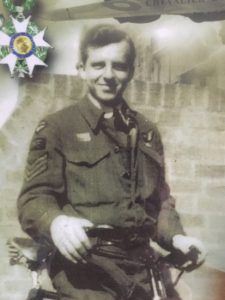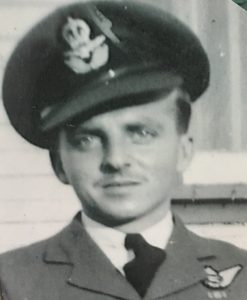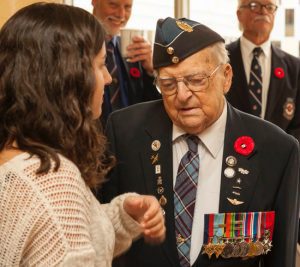
His smile remained as infectious as ever. The twinkle in his eye was still bright during my visit with air force veteran Ed Carter-Edwards this week. When his son-in-law Mike and I lifted him, so that Mike could scratch a nagging itch on Ed’s back, I could feel the muscle in his shoulders that had served him a lifetime.
Now 94, Ed battled this week not just for life, but to stay connected to a hospice room of family and visitors as long as possible. Across from his bed, his son Dennis nodded and summed up his father’s life in a sentence.
“If there was ‘quit’ in his life,” Dennis Carter-Edwards said quietly, “he never would have made it.”
Ed Carter-Edwards ever fought the good fight. A Hamiltonian at birth, when the Second World War broke out, he enlisted in the Royal Canadian Air Force as a teenager. He received his wireless air gunner brevet (badge) in Canada, was shipped overseas and had completed 21 combat operations by D-Day. On his 22nd, June 7, 1944, his Halifax bomber was shot down.
He eluded German troops by hiding in a barn and wearing civilian clothes. The French Underground got him papers for passage across the Pyrenees mountains to Spain, but en route he was betrayed to the Germans.

“Who are you?” his captors demanded.
“A Canadian airman,” he admitted, showing his dog tags.
The German ripped the tags from Ed’s neck, “Now who are you? You’re a spy and will be shot.”
The next five months revealed to Ed Carter-Edwards, like nothing before, the look and impact of all-out war. Thrown in Fresnes prison near Paris, he and dozens of other airmen were beaten, interrogated and crammed into tiny cells. As Allied advances approached Paris, the airmen – now numbering 167 – were packed aboard trains for transport, not to PoW camps, but to Buchenwald concentration camp where 40,000 other political prisoners were systematically being exterminated.
“As we entered the camp,” he told me in an interview, “we saw the electrified barbed wire fences, the towers, guns, guards. We saw these walking skeletons, men with sunken eyes, the walking dead.”
Inside the camp, food was scarce and brutality plentiful. Protection from the Geneva Conventions was as far from that place as one could imagine. Conditions were “the most inhuman I’ve ever experienced,” he said. Then, an odd blessing, Carter-Edwards came down with pneumonia and was transferred to an infirmary where a captured French professor used a syringe to drain fluid from his lungs.
Perhaps five days from execution, Ed and the other airmen were spotted by a German air force official who had them transported to military PoW camps. Just in time.
After the War, Ed Carter-Edwards came home, married his sweetheart Lois, and went to work as a welder at the Westinghouse plant in Hamilton. Times were booming. The company assembly line churned out thousands of refrigerators and stoves for a society tired of war and eager for the fruits of their labour.
Sometimes, however, the labourers paid the greatest price. Hours were long and toxic cadmium – used to keep steel from corroding and to colour glass – was everywhere. Carter-Edwards, no stranger to poor conditions in an enclosed space, campaigned to improve conditions. He worked there 42 years, supporting his family and speaking up for his co-workers’ welfare.
The survivor of Buchenwald never stopped fighting for those with whom he’d served in the RCAF and with whom he’d survived Koncentration Lager Buchenwald. Another KLB survivor, former RCAF officer Bill Gibson, shot down about the same time as Ed, applied for full pension for disabilities caused by the torture and deprivation at Buchenwald. He visited a doctor in Halifax to have his injuries assessed.
“The trouble with you guys that were overseas,” the doctor said, “is that you come back here and think the country owes you a living.”
“Say another word and I’ll punch you in the face,” Gibson told the doctor and had to settle for a monthly disability pension of $3.75.

That’s when Ed Carter-Edwards quietly took up a new cause. He wrote letters. He visited MPs. He testified before a Senate sub-committee to have Canada’s War Compensation Act reviewed. He appeared in the media, which finally published the truth about the 65 Canadian airmen imprisoned at Buchenwald. He and his KLB comrades probably helped to introduce “post-traumatic stress syndrome” to popular use in this country.
At a Remembrance Day event I hosted in 2015, Ed Carter-Edward spoke about his horrific experiences 70 years ago. He held a piece of barbed wire he’d retrieved from a return visit to Buchenwald as a gesture of defiance.
“We survived the Holocaust,” he said. “We were there.”
Coincidentally, this week the world observed two tragic acts. Jan. 27 was Holocaust Remembrance Day. On the same day, the leader of the free world, newly inaugurated Pres. Donald Trump, signed an executive order to ban Muslims from seven countries entering the U.S.
Clearly, we’ll need the strong will and deft touch of an Ed Carter-Edwards to remember the world’s mistakes of inhumanity and to prevent them from being repeated.
Ted, enjoy your columns in the Cosmos, very much. At times you show your political bias and a certain amount is to expected. With regard to this article, Surviving: A Life, although I am far from a Trump fan, I have to call you out on your inaccuracy and poor taste. No where in the executive order does it mention “a Muslim ban,” it is a temporary, I repeat, temporary, ban of refugees and visitors from seven terror linked countries, which incidentally, this country list was created by the Obama administration. Non of the major Muslim countries such as Indonesia, Pakistan etc, was mentioned as it is not a Muslim ban as you state. Obama banned Iraqi refugees in 2011 for 6 months, no mention of that.
http://www.bbc.com/news/world-us-canada-38888909
Trumps order was not rolled out with a great deal of thought granted, but at least it brings the elephant in the room to light.
Lastly, linking this executive order somehow in an offbeat, poorly thought out way to the Holocaust is really cheap sensationalism to promote the MSM’s propaganda.
Executive order – Holocaust? Really?
Perhaps some second thought and a retraction or statement closer to the facts may be in order?
I always read your columns and generally agree while being thoroughly entertained, this one I had to make a comment.